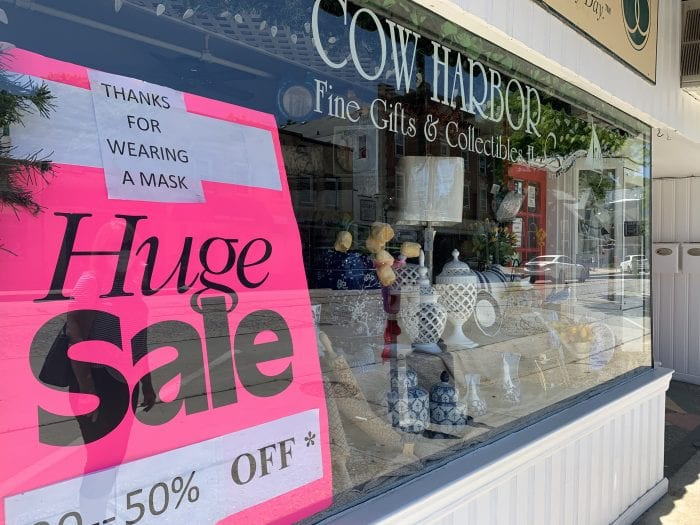Northport Village Businesses Still Struggle Despite Reaching Phase One
By Leah Chiappino
During this time of year, Northport village would normally see swarms of locals, boaters and tourists strolling along Main Street and browsing the artisan boutiques. However, due to the COVID-19 pandemic, the most anyone can do is pick up an item from the front of a village shop or enter the store briefly.
Gov. Andrew Cuomo (D) allowed Long Island retail businesses to reopen for curbside and in-store pickup as part of Phase One reopening May 27. Restrictions include allowing only one person at a time down narrow aisles, mandating that customers wear face coverings and keeping 6 feet distance between themselves and others, and allowing no more than 50 percent capacity into a store at any given time.
For small retail boutiques that rely on customers coming in to browse, this is far from ideal.
Northport Chamber of Commerce President Jim Izzo says that village businesses are following all of the restrictions the governor has laid out and are growing more and more hopeful as said restrictions are lifted. Izzo added the village is actively investigating protocols it can put in place to allow businesses to safely reopen when they are able to do so, including allowing restaurants to use public space in order to increase seating capacity.
“A lot of these restaurants only have 14 or 15 tables, if that,” he said. “If you cut their capacity to 50 percent or 25 percent, it’s going to be hard for them to make a living.”
The village saw a fair amount of traffic this weekend due to the nice weather, though Izzo said they are concerned about the amount of visitors not wearing face coverings.
“We’re hoping through signage, reminders and businesses saying they won’t serve [patrons] without a mask will make people realize it’s important,” he said. “ We don’t want to go backwards.”
Izzo said the hope is that things will continue to open up slowly and safely.
“Unfortunately it’s not as quick as we’d like,” he said. “A lot of people are really struggling financially and psychologically. There’s a lot going on. People have put their life into their small businesses. It’s a seasonal community, if they don’t open by Labor Day, I don’t know how many [local businesses] will make it through the winter … It doesn’t seem to be very practical to have Target open, rather than a small business who sells the same thing, and who could probably have more control over who came and went.”
The owner of Nest on Main, a furniture and home decor multivendor artisan market, Donna Moschella, said that sales have dropped 86 percent from this time last year. She has been forced to layoff her two part-time employees and stop the classes the store offers on anything from blanket making to cake decorating, which are a large source of revenue. Moschella pointed out that not only is her business being affected, but the over 30 artisans that rent space in her store to sell their handmade products are being impacted to an even greater extent.
”Nest is a small family-owned business, so we’re being impacted, but it’s not just Nest, it’s Nest plus 30,” she said.
The store closed around the time of the statewide stay-at-home orders but began offering shopping and contactless local deliveries in April. With Phase One, Moschella has started offering curbside pickup but has not allowed customers into the store. She says she has placed items outside and in the window, while bringing things to the door in order to assist customers in finding what they’re looking for. Customers can also shop via the store’s social media sites, though online listings can be difficult as most items have limited quantities of specific, handmade items.
“It’s difficult, as you can imagine,” she said. “People peek in, they want to come in. I understand the frustration in customers wanting to come in … It’s not an easy way to shop, but we’re doing what we can do based on what we’re allowed to do. What makes Nest unique is that I hear from customers that they like to come in and spend time in the store. There’s so much to look at, and it changes all the time so that Nest is more of an experience then just a place to shop.”
Moschella said that their current system is merely a matter of trying to “stay afloat,” and that they will have to wait to Phase Two in order to do any substantial business. She added that the store’s landlord has been flexible, allowing for greater ease.
The shop has geared up in preparation for the second phase, having installed plexiglass barricades, widened the aisles to allow for physical distancing and is planning on providing hand sanitizing stations throughout the store. They will require customers to wear masks and will provide them to patrons who do not have one, and will hold smaller classes to allow for greater social distancing when they are able to do so in later phases.
“We’re going to adapt and do whatever is necessary to make people feel comfortable, safe and welcome,” she said.
Despite all of these challenges, Moschella remains hopeful for the future.
“I think one of the good things that may come out of this is that people will find an appreciation for small businesses in their community,” she said. “When you really think about what any Main Street would look like without these small businesses and restaurants, that’s not a pleasant thing to think about.”
Holly Levis-Dolan, the owner of PetPort, is also offering curbside pickup but has been allowed to be open the entire time, because they have been deemed an essential business, as they sell pet food.
Levis-Dolan said customers are allowed up to 6 feet into the store to pick out the products they need. Masks and hand sanitizing are required of all customers. The store is also offering same-day delivery of pet food and will match prices found on Amazon when possible. The store will begin to offer pet grooming at a reduced capacity.
“Normally we do eight to 10 dogs per day, and now we’ll probably do four to five,” the store owner said.
“PetPort’s No. 1 priority is to continue to operate in a safe way to protect our staff and clientele,” Levis- Dolan said. “This is a new reality. We can expect to do 50 percent of the business we did before the pandemic. Our staff will have to work smarter and do with less resources. It’s all hands on deck. This will not be changing anytime soon. The economy will be different for a long while.”
Kathie Kitts, the owner of Artisan House, another boutique in the village, like Moschella, began curbside pickup at the door at the start of Phase One. Kitts said with people out in the village due to the nice weather, she made a substantial amount of sales.
Kitts said that the impacts of the restrictions have been enormous. She even tried to file for unemployment, though she could not get through.
“It’s really very difficult because I have bills at home, and I have bills here,” she said. “I’ve barely made anything since March.”







